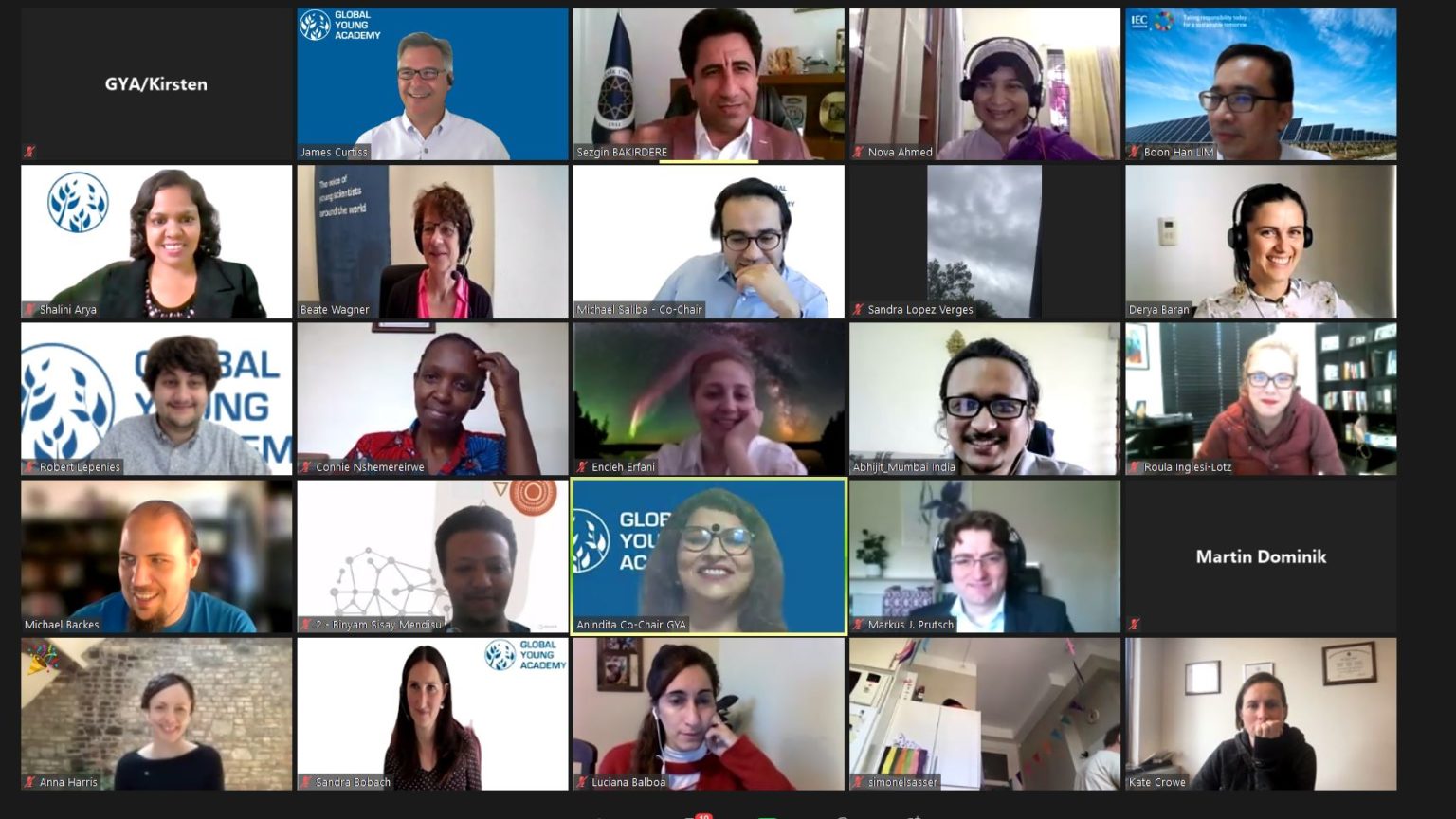The GYA held its second online Annual General Meeting from 1-4 June, together with an online International Conference of Young Scientists on the topic “Trust in Science”, which was open to public participation. Over 170 GYA members and alumni and over 490 external guests from 114 countries registered to take part in sessions throughout the week addressing trust in science, as well as highlighting projects and themes of GYA Working Groups.
Pre-AGM workshops
Science Leadership Workshop – 46 participants, including new GYA members and more experienced GYA members in the role of mentors, took part in this interactive online workshop in early May 2021. Read more about the workshop and Science Leadership Programmes here.
Science Policy Memo Writing Workshop – Organized by the GYA Science Advice Working Group together with the Journal of Science Policy & Governance (JSPG), this satellite event was conceptualised for early-career researchers from around the world interested in improving their science-policy communication skills. Read more about the workshop and find a link to watch the recording here.
Annual General Meeting (AGM)
The week-long AGM included the induction of 31 new GYA members representing 28 countries, and the election of a new GYA Executive Committee (EC). As Co-Chairs, members newly elected Roula Inglesi-Lotz (University of Pretoria, South Africa), and re-elected Michael Saliba (University of Stuttgart, Germany). 30 outgoing members became the newest GYA alumni, among these three former Co-Chairs.
Meetings of the general assembly discussed internal functions and development of the GYA as an organization. Topics discussed included networking and partnerships, committees development and the future of research and science after COVID-19. Live online meetings were supported by asynchronous interaction on a message board platform, the GYA Agora. The GYA’s many Working Groups held working meetings in the weeks before and after the AGM, to integrate new members and make plans for the coming year. A special Working Group newsletter will highlight these plans.
The AGM was an occasion to announce several important decisions and milestones of the GYA:
- In the wake of the passing of an inspiring and beloved GYA alumni, Alexander (Sasha) Kagansky, the EC decided unanimously to re-name the GYA North-South Interdisciplinary Grant to the Sasha Kagansky Interdisciplinary Grant. Sasha was a past recipient of the 2015/2016 North-South Interdisciplinary Grant himself, and he embodied the principles that the scheme seeks to encourage.
- The GYA EC approved a proposal by the At Risk Scholars Initiative to establish an ongoing alternative membership path for up to one GYA membership slot per year. With this decision, the GYA signals its support for at-risk scholars and for academic freedom around the world.
- Starting in January 2021, the GYA is no longer a short-term project, but receives open-ended core funding (subject to annual approval) by the German Federal Government, as well as the State Government of Saxony-Anhalt, where the GYA Office is hosted by the German National Academy of Sciences Leopoldina. This success is thanks to the dedication of several generations of GYA members, leadership, partners and Office staff.
Learning from the challenges and successes throughout the past year of online meetings, the GYA offered data top-up funding to members from low and middle income countries for whom affordable internet access is not always available.
International Conference of Young Scientists “Trust in Science”
International and interdisciplinary panels addressed different aspects of the conference topic “Trust in Science” with expert talks followed by interactive discussions. Earlier this year, a Satellite Panel to the conference started the dialogue by addressing “Trust in Climate Science”.
The panel “Transforming Food Systems: Public Trust and Engagement to reach the UN SDGs” was held to highlight the topic of this year’s UN Food Systems Summit. Panelists made clear that this cross-cutting issue needs bottom-up and top-down solutions, and that industry and regulators as well as consumers, carry the burden of re-thinking and re-shaping food systems to become more sustainable and more equitable. The discussions highlighted the need for a better connection of people with their (local) food systems, in part through more communication in local languages and the spread of knowledge.
“Science Policy Advice – Lessons Learned from the COVID-19 Pandemic” looked at different levels of trust in science, particularly related to science policy advice mechanisms and trust in evidence-informed policy. One focus was on challenges in maintaining or improving confidence in vaccinations and in measures designed to fight the COVID-19 pandemic. The importance of global learning from different national and regional experiences was emphasised.
A lively theoretical debate ensued in the panel “Improving Trust in Science through Communication”, on trustworthiness, as well as on the origins of trust and distrust in society towards science and evidence-informed policy. This panel was organized by the GYA’s “Trust in Young Scientists” Working Group, which unveiled three new videos produced in a collaborative project “SciSo”. More on the project, and links to the short science communication videos here.
Finally, the topic of “Building Trust with Open Science” discussed flaws in science systems themselves and concrete efforts to make science more openly accessible to other scientists as well as to an informed public. The session highlighted international examples before focusing on current efforts by Open Research Europe.
GYA Working Groups held public presentations which were open to conference participants, generating questions and debates among participants from around the world. An overview of Working Group Sessions is available online.
Recordings of all public sessions are viewable online here: Videos of the GYA | Global Young Academy.
GYA Partners
Many thanks to the GYA members and alumni, conference speakers, partner organisations and funders working together to make this online gathering possible: the InterAcademy Partnership and the Gordon and Betty Moore Foundation. The Global Young Academy also gratefully acknowledges core funding from the German Federal Ministry of Education and Research.
